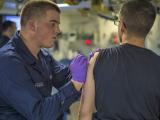May 14, 2002 (CIDRAP News) – Medical groups and the public will have opportunities over the next month to give their views about smallpox vaccination issues as federal health authorities consider revising their current policy against vaccination of the general population.
Public forums will be held June 6 in San Francisco and New York City and June 8 in San Antonio and St. Louis to present information about smallpox and smallpox immunization and to gather comments from healthcare professionals and the public, said Curtis Allen, a spokesman for the National Immunization Program at the Centers for Disease Control and Prevention (CDC) in Atlanta.
In addition, there are tentative plans for a meeting of CDC partners such as physician organizations and emergency responders May 29 and 30 in Atlanta, Allen said. "There also will be a meeting at the National Academy of Sciences, but no date has been set," he said. The CDC also will receive public comments via its Web site, he added.
Plans for the meetings were made last week at a meeting of the smallpox working group, a joint committee of the CDC's Advisory Committee on Immunization Practices (ACIP) and the National Vaccine Advisory Committee. The working group is scheduled to make recommendations about smallpox vaccination to ACIP when that group meets in Atlanta June 19 and 20, Allen said. "From that point, the ACIP will make recommendations and present them to the director of the CDC, who will present recommendations to HHS [the Department of Health and Human Services]," Allen said.
Current CDC guidelines, issued in June 2001, when the smallpox vaccine stockpile was only 15 million doses, do not recommend smallpox vaccination for the public. But HHS expects to have 286 million doses of vaccine by the end of this year, and last fall's terrorist and anthrax attacks increased fears that terrorists could obtain and release smallpox virus. The CDC's interim smallpox response plan calls for ring vaccination—vaccination of contacts of smallpox patients—rather than pre-emptive mass vaccination of regional populations or the whole country. The vaccine can cause serious reactions in immunocompromised people and those who have eczema; experts estimate that about 1 in 1 million vaccine recipients would have a fatal reaction.
A CDC background paper says the smallpox working group is considering the following questions:
- With no known cases of smallpox worldwide, should routine smallpox vaccination be resumed in the United States?
- Should recommendations for the use of vaccine be dependent on or modified based on the available supply of smallpox vaccine?
- Should public health and medical personnel identified as early responders to a possible smallpox case or attack be vaccinated prior to such an event?
- If responders to a smallpox event should be vaccinated prior to an event, what guidelines should be established to determine which responders to vaccinate?
- Should the current recommendations for "ring" vaccinations as the strategy of choice for the control of smallpox in the event of an attack be modified?
Allen said he didn't have a sense of which way the working group was leaning on the major questions it faces. The Wall Street Journal reported last week that the panel opposed mass vaccination but favored vaccination of some hospital personnel and public health workers as a preparedness step. But Allen called that report speculative. "Individuals had opinions on the way the working group could go, but I didn't have the sense of where the group was going, and I don't think we'll have that until the 19th [of June]," he said.
At the public meetings, CDC officials will brief the audience about smallpox, the current vaccination recommendations, and risks associated with vaccination, Allen said. Officials then will take comments from "stakeholders" (such as healthcare professionals) and, finally, from the public. The sessions are tentatively scheduled to run from 9 a.m. to 4 p.m. but will last longer if necessary to take all comments, Allen said. Details such as how to register to speak have not yet been decided, he said.
The CDC partners meeting tentatively set for May 29 and 30 will be for "major stakeholder organizations" such as the American Medical Association, major medical specialty societies, and emergency responders, according to Allen. He said the Web page for receiving public comments will be set up later this week on the National Immunization Program's site (www.cdc.gov/nip).
Allen said the production of smallpox vaccine to augment the national stockpile seems to be proceeding smoothly. "We're hearing from the manufacturers that the supply should be improved by the end of the year," he said. HHS has two contracts with Acambis, a British firm, for a total of 209 million doses of vaccine. In addition, a study published this spring showed that the vaccine in the existing stockpile can be diluted by 5:1, which would expand the stockpile from 15.4 million to 77 million doses.
A possible additional source of vaccine is a stockpile of 70 million to 90 million doses of old vaccine held by Aventis Pasteur. The company revealed the supply last month and said it would give it to HHS, which said it would acquire the vaccine pending the results of safety and effectiveness tests.
The Acambis vaccines are being produced in laboratory cell cultures, whereas the existing vaccine was derived from cows. Both the Acambis vaccines and the existing vaccine will be classified as investigational new drugs (INDs) until human safety trials can be completed, Allen said. The existing vaccine is in IND status because it has been in storage for many years and because it will be diluted, he said. IND status means that each person will have to read and sign an explanation of the risks (informed consent form) before being vaccinated.
Routine smallpox vaccination in the United States was stopped in 1972, and the disease was declared eradicated in 1980. However, the United States and Russia hold supplies of the virus for research purposes. Concern about bioterrorist use of smallpox is based mainly on the fear that some of the Russian supply may have fallen into the wrong hands.



















